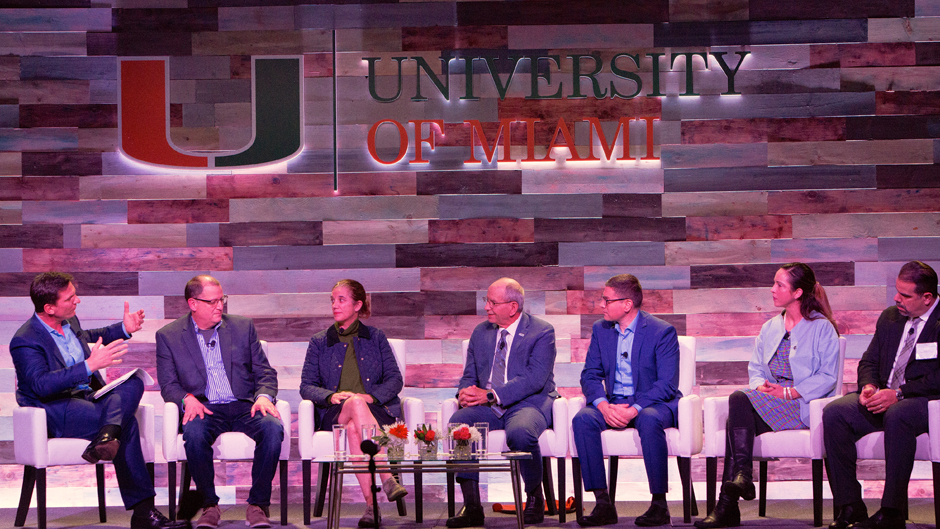As South Florida faces the complex challenges of hurricanes, sea level rise and street flooding, the three-day Miami Climate Change Symposium 2020: “Predicting and Living with Extremes” brought leading scientists together with students and community leaders in a wake-up call for collaborative action.
“Few issues are as complex as climate change and we are at ground zero for those threats,” said University of Miami President Julio Frenk. “It is our hope to uncover solutions, translate them into actionable evidence, and use that evidence to guide decision-making at every level from individuals to government leaders.”
More than 300 researchers, students, and leaders from the public, private and nonprofit sectors attended the January 22-24 symposium, organized and hosted by the University of Miami Rosenstiel School of Marine and Atmospheric Science. “We brought renowned marine, atmospheric and earth scientists together for an in-depth look at how climate change is exacerbating extreme weather events,” said Dean Roni Avissar.
Ben Kirtman, professor of atmospheric sciences, led a Rosenstiel scientific advisory committee for the symposium that included professors Emily Becker, Kenny Broad, Amy Clement, Katharine Mach and Brian Soden. “We took a unique approach, bringing scientific information to our local community, identifying risks and discussing how to respond to these risks,” said Kirtman.
Scientific presentation at the symposium included the following highlights:
• Sea level rise is accelerating, posing multiple threats to coastal communities.
• Hurricanes are likely to become stronger, if not more numerous.
• Heat waves and droughts more frequent in the Great Plains.
• Wildfire risk will increase in the west, but not in Florida.
• Extreme rainfall events like Hurricane Harvey will occur more frequently.
These climate-related threats have serious implications for the nation’s real estate, insurance and financial markets, as well as public health, transportation, coastal archeological sites, and endangered wildlife species, according to symposium presenters.
Along with the risks, the symposium included session on resiliency through adaptation strategies, such as strengthening threatened coastal reefs to mitigate the impact of storm surge or elevating streets and water and sewer plants as sea levels rise.
“We need to build a bridge between risks and resilience strategies, and show how communities will benefit from resiliency investments,” said Roger Pulwarty, director of the U.S. National Integrated Drought Information System at the National Oceanic & Atmospheric Administration (NOAA) in Boulder, Colorado.
Jim Murley, chief resilience officer, Miami-Dade County, emphasized the importance of governmental collaboration in addressing the challenges, including the Southeast Florida Regional Climate Change Compact. “All our four counties are working off the same projections,” he said. “What we learn here can provide important lessons for other places around the world.”
More than a dozen organizations sponsored the symposium, including the Village of Key Biscayne, whose mayor and city manager addressed the challenges facing their island community. Other sponsors included FPL, which provided an update on its storm hardening and solar power programs, and Royal Caribbean, which outlined how it is reducing emissions from cruise ships.
In his keynote talk, “Disasters and Climate Change: The Global and the Local,” Adam Sobel, director of the Initiative on Extreme Weather and Climate at Columbia University, emphasized the importance of mitigating the release of greenhouse gases (GHGs) like carbon dioxide that contribute to heating the atmosphere.
“While the science of climate change is very important, both adaptation to local changes and global mitigation of emissions are political issues,” Sobel said. “You should engage politically, because the issue is what kind of future we want for our planet.”
It’s a message that resonated with UM students, as well as faculty, staff, alumni and community supporters. “Climate change is the most significant challenge facing our generation,” said Delany Reynolds, a junior majoring in marine science and coastal geology who founded the “Sink or Swim Project,” which educates young people about climate change.
Wrapping up the symposium, Bill Weir, CNN chief climate correspondent, led a panel discussion that included several pointed questions from the audience on solar power, investment policies and other environmentally oriented topics. “Climate change is real, but most people don’t talk about it ,” Weir said. “So, we need to get those conversations going.”
At the end of the symposium, UM Provost Jeffrey Duerk announced the university would organize future events on other aspects of climate change. He said, “We will continue to bring together experts and translate science and data into solutions and policy.”
Sponsors included Florida Power & Light Company, University of Miami NOAA Cooperative Institute for Marine and Atmospheric Studies, National Science Foundation, William J. Gallwey, III Esquire, Rosenstiel School of Marine and Atmospheric Science, Royal Caribbean Cruise Lines, Key Biscayne Community Foundation, The Village of Key Biscayne, University of Miami Abess Center for Ecosystem Science and Policy, Atlantic Council Adrienne Arsht-Rockefeller Foundation Resilience Center, Miami Dade County, Southeast Coastal Ocean Observing Regional Association, The Florida Climate Institute and Diane Davis-Merrill Lynch Wealth Management, along with media partners NBC6 Miami and CNN.
For more information, visit: https://climate2020.miami.edu/
Video of Miami Climate Symposium 2020: Predicting and Living with Extremes Public Event: https://www.youtube.com/watch?v=RTnO7zdeYDA&t=7s

